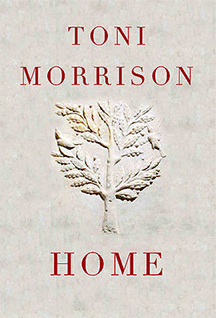By Carey Wall
You can go home again. Home is the story of Frank Money and his younger sister Ycidra, usually called Cee. In the course of this compact novel, the two go home again to Lotus, Georgia, and home as well to their true selves. They return, as if for the first time, after participating shockingly in grotesquerie brought on by the Korean War, and perhaps more, in Frank’s case, and by youthful self-abandonment and racism in Cee’s. As the book begins Frank is back from frontline service in the Korean War and a near zombie. He has played on an attractive and available woman’s feelings to move into her home and her bed. After immediate euphoria, the connection between to two quickly fades. The woman frequently finds Frank at home just looking at the floor. He is haunted by the battlefield deaths of the two homeys with whom he enlisted and fought. She is relieved when Frank gets a call to come get his sister or she will soon be dead and leaves. Cee has been the first person for whom Frank has taken responsibility after their mother died and their self-interested father has married a bossy, self-interested woman who had no use for the children. The call to save Cee draws Frank powerfully and finally saves him from his central demons. Home is a story of healing and coming into self-possession in a place that holds their relationship and that offers them the maturity of possession of the good of the place they once found had nothing for them.
Racism thrives and is not conquered in Home. The man who nearly kills too-accepting young Cee, is Dr. Beauregard Scott (Is this once again the Scott of romantic novels with whom the old South became obsessed?), a great Confederate, with two institutionalized daughters with too-large heads (degeneration of the white race?) and an obsession with the womb. He experiments on Cee in the vein of the Nazis. Frank’s getting to Cee just in time saves him from the act of his own that has most tormented him; it occurred in Korea and involved a girl who must have reminded him of Cee except that she was other. Seeking information about a place where as children Frank and little Cee witnessed some white men’s hidden activity, the adult Frank learns a story of white men’s torture of black men that has Morrison’s characteristic gut punch.
The most attractive passages in the book, describing the black country women who restore Cee to health and become her models for self-possession, celebrate the goodness of a place like Lotus:
“. . . Cee had nothing to do but pay them the attention she had never given them before. . . . Although each of her nurses was markedly different from the other in looks, dress, manner of speech, food, and medical preferences, their similarities were glaring. There was no excess in their gardens because they shared everything. There was no trash or garbage in their homes because they had a use for everything. They took responsibility for their lives and for whatever, whoever else needed them. . . . Whether you were in the field, the house, your own backyard, you had to be busy. Sleep was not for dreaming; it was for gathering strength for the coming day. Conversation was accompanied by tasks: ironing, peeling, shucking, sorting, sewing, mending, washing, or nursing. You couldn’t learn age, but adulthood was there for all. Mourning was helpful but God was better and they did not want to meet their Maker and have to explain a wasteful life.”
In Lotus at that time even cotton picking can be made useful, Frank discovers: “Like all hard labor, cotton picking broke the body but freed the mind for dreams of vengeance, images of illegal pleasure—even ambitious schemes of escape.” Frank finds a means of taking a redemptive action that makes him feel like a man.
Carey Wall is professor emerita in the Department of English and Comparative Literature at San Diego State University. San Diego State University is home to the Nu of California chapter of Phi Beta Kappa.




